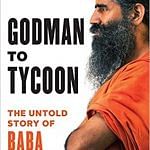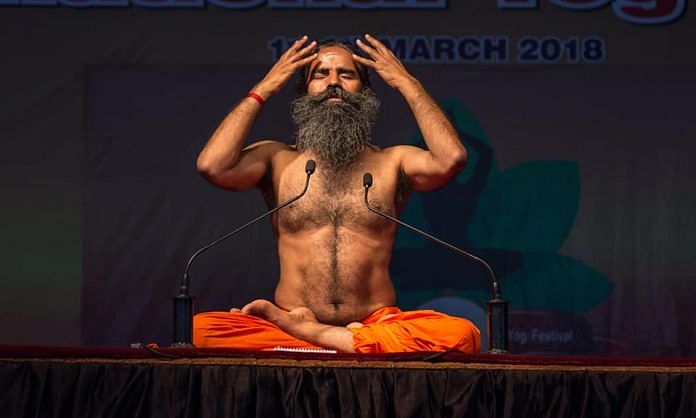In this book excerpt from ‘Godman to Tycoon: The Untold Story of Baba Ramdev’ Priyanka Pathak-Narain writes about the suspicious death of one of Baba Ramdev’s associates that continues to haunt the yoga guru.
The man always standing beside Ramdev now was Rajeev Dixit, national secretary of the Bharat Swabhiman Andolan. As mentioned earlier, Ramdev hoped to eventually convert the Bharat Swabhiman Andolan, technically a trust, into a full-fledged political party. With Ramdev’s ballooning political ambitions, Rajeev Dixit’s importance also grew. He was now the key man, at the heart of all the action – adviser to and architect of Ramdev’s sociopolitical messaging. Balkrishna and Ram Bharat looked on resentfully as Rajeev Dixit, a suave outsider, far better educated and articulate than either of them, usurped their positions as advisers and became Ramdev’s trusted political mentor.
***
Shortly after founding the party, in September 2010, in a bid to increase its membership, Ramdev and Dixit planned the Bharat Swabhiman yatra, where both leaders fanned out to various districts around the country to raise awareness for their movement and its goals.
But Dixit was not unaware that his presence in Haridwar and closeness to Ramdev was causing unpleasantness. Madan Dubey, a long-time associate of Rajeev Dixit who continues to propound the views of the Azadi Bachao Andolan, says, ‘He must have been troubled . . . because that July [2010] when I asked him. . . if I should also sign up to become a member of Bharat Swabhiman Andolan, he told me to wait. He told me he was not sure . . . and that made me think there was something going on.’
***
On 30 November 2010, two months after Ramdev and Rajeev Dixit began their nationwide Bharat Swabhiman yatra to drum up support for their party, Dixit was dead. He died on his forty-third birthday.
After a massive cardiac arrest, Dixit collapsed in a locked bathroom in an Arya Samaj guest house in the remote town of Bemetara in Chhattisgarh where he was delivering a lecture. Although he was rushed to a nearby hospital, he did not last through the night. According to Ramdev, Dixit had refused to have the medicines prescribed to him by the local doctor.
Pradeep Dixit says, ‘The Bharat Swabhiman Andolan workers who were in Chhattisgarh with Rajeev called me when they were taking him to the hospital. I could not speak to him because they said he was not in a condition to talk . . . By the time I reached him early the following morning, my brother was dead.’
But in a televised address on Aastha channel, Ramdev said that while he was not present with Dixit in Bemetara, he had spoken to him over the phone. Not just that, they had spoken for a whole hour about Dixit’s poor health and line of treatment: ‘Maine karib ek ghante tak unko samjhata raha, ek ghante tak! Bhai Rajeev, ab shareer mein dikkat aa rahi hai to . . . unko shayad yeh genetic bimari thi . . . BP ki, sugar ki, heart ki . . . teeno.’ (I kept trying to explain to him for an hour, a whole hour! Brother Rajeev, there is a problem in your body . . . He probably had a genetic condition of blood pressure, diabetes and heart disease . . . all three.)
Pradeep Dixit cannot help but wonder now: how had his brother, who Ramdev’s men had told him was in no condition to speak on the phone, managed to have an hour-long telephonic conversation with Ramdev about the ideal line of treatment? He also asserts that his brother suffered from no ailments and had never taken medicines for diabetes, blood pressure or a heart problem.
After Dixit died, a seemingly grief-stricken Ramdev had spoken to the family over the phone and requested them to allow him to arrange for the last rites on the banks of the Ganga in order to honour him. The stunned family went along with Ramdev’s plans. So, instead of taking Dixit’s body back to Wardha where it would otherwise have been flown to, it was transported to Haridwar on a chartered plane.
But something was unsettling the onlookers: Dixit’s face ‘was unrecognizable . . . a strange purple and blue. His skin was peeling strangely. There was some black, blue blood around his nose,’ Dubey remembers. People huddled discussing Dixit’s sudden death and the strange colour of his body. As more and more people streamed in, conspiracy theories about his death began to swirl wildly. Soon people began discussing the need for a
postmortem.
***
Dubey finally said out loud what many were whispering: ‘There has been foul play . . . I want to know if anyone else feels that a postmortem should be conducted.’
He asked those who raised their hands to sign a petition addressed to Ramdev, demanding a postmortem before the cremation. By nightfall, there were fifty signatures on it.
At six the next morning, a group of nine men walked through grey winter mist to take the petition to Ramdev, only to be stopped by the guard who refused to let them enter the two-storey building complex where Ramdev used to live at that time. Dubey told the guard, ‘All right then, please go and tell Babaji that if he does not meet us, Dixit’s dead body will not be allowed to be cremated.’
Finally, Ramdev relented to a meeting at 7.30 a.m., and called in Dubey and his associates but ‘only after taking away our cellphones, to make sure nothing was recorded,’ Dubey recalls, a fear that even Kirit Mehta referred to during his fateful encounter with Ramdev.
Dubey sat closest to Ramdev – he had been appointed the speaker for his party. ‘I gave him the petition, signed by fifty people, asking for a postmortem,’ says Dubey. According to Dubey, this is how that meeting unfolded:
Ramdev asked, ‘So what do you want?’
Dubey replied, ‘All of us are trustees of the Azadi Bachao Andolan and we want a postmortem.’
‘What is the need for it? This is a natural death.’
‘We have our doubts. So, let’s get a postmortem done. It’s very simple.’
‘But I spoke to the doctors myself. I have reports from the doctors that he had a heart attack and all that.’
‘We don’t trust it. We want a postmortem’
***
Ramdev was growing angrier by the minute at what he must have seen as Dubey’s insolence. He tried to rule out a postmortem saying it was against ‘Hindu dharma’. But Dubey dismissed this objection saying, ‘He [Rajeev Dixit] had no dharma. His dharma was the service of his country. He never called himself a man of any religion. So don’t worry about Hindu dharma and get the postmortem done. It is good for you and it is good for us that all this becomes clear. Otherwise, fingers will be pointed . . .’
***
It was at this point that Dubey claims he became incredibly blunt: ‘Rajeev Dixit did have fights with some of your people, didn’t he? Your people had differences with him, didn’t they? I know they were upset that some outsider like Rajeev Dixit came out of nowhere and became the national secretary of the Bharat Swabhiman Andolan. They were jealous that thousands of people used to come to meet him.’
This back and forth went on for over an hour, says Dubey. Finally, Ramdev suggested that they all go to the hall where Dixit’s body lay, and ask the people there, and the Dixit family, for their opinion. This sounded like a reasonable thing to do.
But while Ramdev sat in his car with his people and sped off, Dubey and the others in his party followed on foot to the hall that was a twenty-minute walk away. Before Dubey and Company could get there, a visibly angry Ramdev stormed into the hall, took the microphone and said, ‘Some people have come from Mumbai. They want me to do a postmortem . . . such cutting [of a dead body] is not permitted in Hindu dharma.’
One of the mourners present in the hall, a Dr Suman from Haryana who was closely involved with the work of the Bharat Swabhiman Andolan and Rajeev Dixit, stood up and said, ‘So why aren’t you getting it [a postmortem] done?’ Ramdev was livid at being openly questioned, and was in no mood to answer.
Turning to his men, he commanded, ‘Get the body ready for its final journey.’ The cremation was originally scheduled for 11 a.m. It was still only nine. Ramdev’s men got the body ready for cremation, quickly carried it into an ambulance, and set off for the cremation ghats. ‘We were just arriving at the hall after our walk from his house when we saw the ambulance driving away with Rajeev bhai’s body in it,’ remembers Dubey. ‘We panicked and tried to stop the ambulance from leaving because we knew that once the body was cremated, our questions could never be answered,’ says Dubey, his voice still filled with regret.
As the convoy drew up to the cremation ghats, where thousands of people had already gathered, Ramdev turned to Pradeep Dixit and suddenly said, ‘Look, if you want, we can do the postmortem.’
Taken aback, Dixit said, ‘Swamiji, all these people are already here. You have taken a decision for all of us not to do the postmortem. There is no point talking about it now, is there?’
When asked why he said this, Pradeep Dixit explains, ‘What was I supposed to say? Everyone had reached the cremation ghat. I didn’t know what to say . . . People were whispering all kinds of things to me. If they were true then what was the guarantee that the postmortem report would not be doctored? . . . I was not in a condition to defy him.’
***
The rumours that began that day have followed Ramdev ever since. On multiple occasions and at press conferences, he has addressed them head-on on Aastha, calling them an ‘irresponsible, wicked conspiracy’ against him.
Dubey, a lifelong friend and mentee of Rajeev Dixit’s, says he will regret the moment of his cremation till his dying breath. ‘After the cremation, when Rajeev bhai’s laptop and his two phones were returned to his family, they discovered that all three devices were completely wiped clean. All data on all three devices had been erased. I saw Rajeevji’s room in Haridwar in a ransacked condition, things and documents missing from his room after his death . . . I’ve felt absolutely sure that there was foul play in Rajeevbhai’s death . . . I know it. I saw the body. I will never stop saying it,’ he asserts.

This excerpt was taken from the book Godman to Tycoon: The Untold Story of Baba Ramdev. It was written by Priyanka Pathak-Narain and published by Juggernaut books.




this really needs to be taken under consideration and strick actions need to be taken for better results.